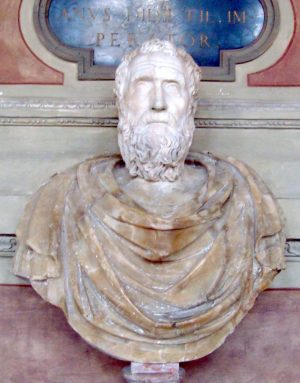| Didius Julianus | |
|---|---|
 |
|
| Roman Emperor | |
| In Power | Mar 28 – Jun 2, 193 |
| Born | Jan 29, 133 Mediolanum, Italy |
| Died | Jun 2, 193 (aged 60) |
| Wife | Manlia Scantilla |
Marcus Didius Severus Julianus was born in 133 to a wealthy and influential family. He had two brothers, Didius Nummius Albinus and Didius Proculus. Julianus was raised by the mother of Marcus Aurelius, Domitia Lucilla, and she gave him a good start in life. Because of her prestige and influence, the young Julianus was accepted into Rome’s College of Minor Magistrates. Around this time too, he married Manlia Scantilla, and they had one daughter.
After his role as a magistrate, he became a quaestor, and then after this, an aedile. In 162, he was appointed as praetor and then became governor of northeastern Gaul, where he fended off assaults by the Chauci tribe. Julianus would also govern Germania Inferior and Dalmatia before Commodus put him on trial, on suspicions that he was involved in a plot against the emperor. He was proven innocent, and later on, governed Bithynia and became proconsul of North Africa.
Reign
When the mentally unstable Commodus was strangled to death in 192, he was succeeded by Pertinax. Pertinax, however, ruled for only three months before being slain by a group of soldiers. After this, the Praetorian Guard declared that the throne would be auctioned off to the highest bidder. Pertinax’s father-in-law, Titus Flavius Sulpicianus, made a bid of 20,000 sesterces, but Julianus edged him with an offer of 25,000. He was then welcomed into the palace and proclaimed emperor. The Senate felt offended by the auctioning off of the imperial throne but can do nothing, as Julianus had the support of the military.
Julianus was not only disliked by the Senate, but the people also found his purchase of the throne disgusting. Whenever he showed up in public, he often received ridicule from the crowd. As Julianus’ public image worsened, three generals positioned themselves to overthrow him: Septimius Severus, governor of Pannonia; Pescennius Niger, governor of Syria; and Clodius Albinus, governor of Britain. Of the three, Severus had the largest support, with 16 legions at his command.
Julianus ordered his soldiers to fortify the city, but they ignored him. He then offered Severus to be his co-emperor, but Severus refused. About Julianus’ circumstance, the historian Gibbon wrote, “…in the invincible and rapid approach of the Pannonian legions, he saw his inevitable doom.” Severus proclaimed himself emperor, and then, to sway Albinus to his side, offered him the title of Caesar. Albinus accepted the offer, and Severus moved towards Rome. Soon after, the unpopular Julianus was deserted by his terrified supporters. Severus entered Rome unopposed.
Death
In 193, the Senate proclaimed Severus as the new emperor and ordered the execution of Julianus. Julianus was found in the palace by an assassin and was stabbed to death and beheaded. His last words were, “But what evil have I done? Whom have I killed?” His body was turned over to his wife and daughter, who were spared by Severus.
To denounce memories of Julianus’ reign, Severus ordered a damnatio memoriae against the dead emperor, erasing his name from official records. He ruled for only 66 days.